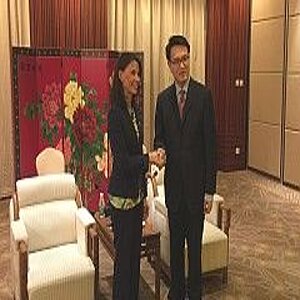100% renewable – Dunhuang shows how it’s done!

The Chinese city of Dunhuang has set itself the goal of meeting 100% of its energy consumption for electricity, heating and transport with renewable energy sources by 2020.
In 2015, energy for the heat and transport sectors in the Chinese city of Dunhuang still originated almost entirely from fossil energy sources. In mid-2016, the city decided to meet 100% of its energy consumption for electricity, heating and transport with renewable energy sources by 2020. Dunhuang is one of three Sino-German New Energy Demonstration Cities being advised on how to create integrated energy concepts in a project operated by the International Climate Initiative (IKI) of the Federal Ministry for the Environment (BMUB). As a model city committed to increasing its share of renewable energy, together with other Chinese cities it is also receiving support from the Chinese government.
More and more cities in China are working to restructure their local energy supply systems and make them sustainable. In 2012, the National Energy Administration of China (NEA) selected more than 80 pilot cities which have pledged to increase their share of renewable energies in primary energy consumption. The IKI project Sino-German Climate Partnership and Cooperation on Renewable Energies is helping three cities restructure their energy supply systems.

The first step was to conduct an assessment of the current energy situation in the three selected pilot cities and draw up a detailed energy balance. In a second step, the potential for renewable energy expansion as well as for energy savings and efficiency was described. The different development scenarios for future energy demand were then projected and models created to calculate the possibilities for sustainable transformation of the local energy system. This served as a basis for identifying concrete measures and recommendations for action, as well as proposing concepts for continuous monitoring of implementation and optimisation in the respective cities. The integrated energy concepts provide a scientifically sound basis for the cities to make decisions about the development of their medium-term to long-term climate and energy strategy.
The Mogao Caves (UNESCO World Heritage Site) make Dunhuang a popular tourist destination. With a population of 142,000, the city in Gansu Province is one of the smaller cities in China. Situated in a large desert area with high solar radiation, Dunhuang offers ideal conditions for operating solar power plants. The local solar park with 663 MWp of installed power produces around 640 GWh of electricity annually (as at 2015). An additional roughly 160 GWh is generated from hydropower. This means that in 2015 Dunhuang already produced more than 2.5 times as much electricity from renewable energy sources than it consumed (around 307 GWh). More than half of the electricity generated from renewables in 2015 was exported to other provinces of China. Electricity accounted for only around 7% of end consumption, while heating and transport were responsible for approximately 74% and 19% respectively. To increase the local use of electricity generated from renewable energy sources and its share in end energy consumption, the city plans to use the excess solar power to supply heating and for electrification of the local public and tourist transport system. The aim is to meet 100% of energy demand for electricity, heating and transport with renewable energy by 2020. The energy concept developed under the scope of the IKI project includes specific measures and project proposals designed to increase the share of renewable energies in urban energy consumption. The IKI project is being implemented by the Deutsche Gesellschaft für Internationale Zusammenarbeit (GIZ) GmbH in cooperation with the National Energy Administration of the People’s Republic of China (NEA) and the China National Renewable Energy Centre (CNREC).
China’s interest in German experience with the promotion of local climate change mitigation and the development of long-term strategies to restructure local energy supply is growing. In addition to the IKI, the BMUB’s National Climate Initiative in particular offers good starting points for intensifying bilateral exchange.
The link has been copied to the clipboard
Contact
IKI Office
Zukunft – Umwelt – Gesellschaft (ZUG) gGmbH
Stresemannstraße 69-71
10963 Berlin
Related Publications
-
 04/ 2016 | Country Profile
04/ 2016 | Country ProfileClimate Protection in China
Englisch | English (PDF, 477 KB)
Chinesisch | Chinese (PDF, 745 KB)









